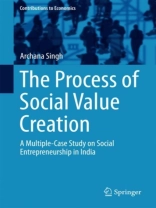This book discusses social entrepreneurship, especially in context of India. It focuses on understanding the whole process of social value creation, i.e. social entrepreneurship – opportunity identification, resource mobilisation, social value, capabilities of social entrepreneurs and innovation in three different types of social enterprises – (i) non-profit or charitable ones; (ii) non-profit social enterprise, sustainable with the combined income of grants, subsidies and own earned income; self-sustainable not-for-profit social enterprise; and hybrid social enterprise; and (iii) for-profit social enterprises. Sample cases of social entrepreneurs (Ashoka Fellows) were selected from three inter-linked sectors — health, education and livelihood. To provide a comprehensive view, interviews were taken not only from the founders (social entrepreneurs), management personnel, and other employees, but also from the beneficiaries. The book comprises how, on the basis of cross-comparison between three types of social enterprises, several propositions and finally theoretical framework on social entrepreneurship have been developed. It proposes that social entrepreneurship can be acquired and that these social entrepreneurs can help solve the larger social problems faced both by developing and developed nations.
Tabla de materias
Chapter 1. Introduction.- Part 1. In Search of Meaning.- Chapter 2. Reviewing Social Entrepreneurship Knowledge.- Chapter 3. The Conceptual Model: Contextualising Social Entrepreneurship.- Part 2. Caselets.- Chapter 4. Indian Social Entrepreneurs.- Part 3. The Process of Social Value Creation: Toward Emerging Theory of Social Entrepreneurship.- Chapter 5. The Concepts of ‘Social Value Creation’ and ‘Social Value’.- Chapter 6. Opportunity Recognition/Identification.- Chapter 7. Resource Mobilisation (Resourcefulness).- Chapter 8. Capabilities of Social Entrepreneurs.- Chapter 9. Creating Values for the Beneficiaries: Interplay of Opportunity Recognition, Resource Mobilisation (Resourcefulness) and Capabilities of Social Entrepreneurs.- Part 4. Conclusion.- Chapter 10. Summary and Conclusion.
Sobre el autor
Archana Singh is an Assistant Professor at the Centre for Social Entrepreneurship, School of Management and Labour Studies, Tata Institute of Social Sciences (TISS), Mumbai, India and is presently working in the field of social entrepreneurship. Prior to this academic positions, she has worked with different non-governmental organisations (NGOs) in rural as well as in urban areas on diverse issues such as women’s Self Help Groups (SHGs), women empowerment, reproductive and child health, and HIV/AIDs awareness among sex workers. Dr. Singh obtained her Ph D and MPhil from TISS, Mumbai, and has published in national and international journals (
International Journal of Social Entrepreneurship and Innovation,
International Journal of Sociology and Social Policy, and
Social Marketing Quarterly) in areas of social entrepreneurship, technology and innovation, and social change. She has also contributed in the edited book ‘Technology and Innovation for Social Change’(Springer, 2014). Apart from teaching at TISS (Mumbai and Hyderabad campus), she has been involved in teaching to Graduate students at Kennesaw State University, Georgia, Atlanta (USA) through web mode. Her research interests include social entrepreneurship, women empowerment, social value, social change, social work, and corporate social responsibility.












